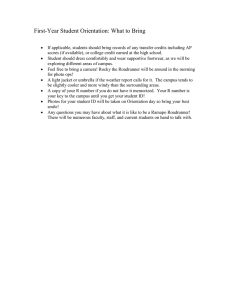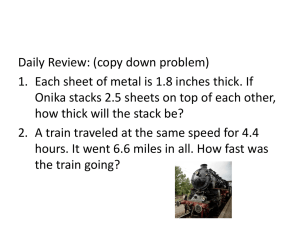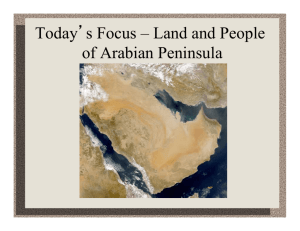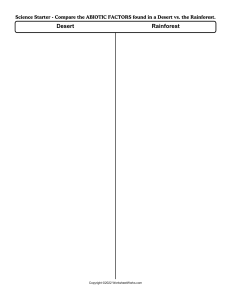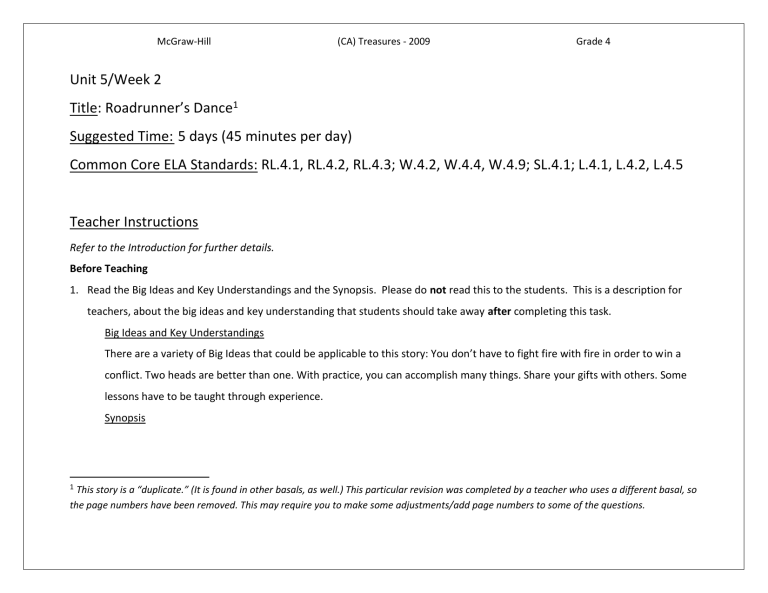
McGraw-Hill (CA) Treasures - 2009 Grade 4 Unit 5/Week 2 Title: Roadrunner’s Dance1 Suggested Time: 5 days (45 minutes per day) Common Core ELA Standards: RL.4.1, RL.4.2, RL.4.3; W.4.2, W.4.4, W.4.9; SL.4.1; L.4.1, L.4.2, L.4.5 Teacher Instructions Refer to the Introduction for further details. Before Teaching 1. Read the Big Ideas and Key Understandings and the Synopsis. Please do not read this to the students. This is a description for teachers, about the big ideas and key understanding that students should take away after completing this task. Big Ideas and Key Understandings There are a variety of Big Ideas that could be applicable to this story: You don’t have to fight fire with fire in order to win a conflict. Two heads are better than one. With practice, you can accomplish many things. Share your gifts with others. Some lessons have to be taught through experience. Synopsis 1 This story is a “duplicate.” (It is found in other basals, as well.) This particular revision was completed by a teacher who uses a different basal, so the page numbers have been removed. This may require you to make some adjustments/add page numbers to some of the questions. McGraw-Hill (CA) Treasures - 2009 Grade 4 A Rattlesnake proclaims that he is king of the road. He terrorizes villagers and refuses to let them pass on the road. The villagers seek the help of the Desert Woman. With the help of the other animals, she creates the Roadrunner to teach Rattlesnake a lesson. 2. Read entire main selection text, keeping in mind the Big Ideas and Key Understandings. 3. Re-read the main selection text while noting the stopping points for the Text Dependent Questions and teaching Vocabulary. During Teaching 1. Students read the entire main selection text independently. 2. Teacher reads the main selection text aloud with students following along. (Depending on how complex the text is and the amount of support needed by students, the teacher may choose to reverse the order of steps 1 and 2.) 3. Students and teacher re-read the text while stopping to respond to and discuss the questions and returning to the text. A variety of methods can be used to structure the reading and discussion (i.e.: whole class discussion, think-pair-share, independent written response, group work, etc.) Text-dependent Questions What genre is this story? Use details/evidence can you find from the story to support your answer. Evidence-based Answers Folk tale, fiction; The snake speaks. (It has talking animals, it has a problem, it has a snake threatening people on the road, etc. Why are the elders unable to pass on the road and need to go to Sacred Mountain to speak to Desert Woman? Rattlesnake proclaims he is the king of the road and refuses to allow the elders to pass on the road. The elders went to Sacred Mountain to speak with Desert Woman because she created all the desert creatures and they wanted her help to stop the snake from making it impossible for them to visit their neighbors and fields across the road. McGraw-Hill (CA) Treasures - 2009 What evidence from the text show that the Desert Woman was hesitant about helping the elders try to solve their problem? The villagers complained to the desert Woman about Snake not allowing them to pass on the road. What did the Desert Woman do in order to help the village people? Grade 4 “Desert Woman thought for a long time. She did not like to interfere in the lives of the people and animals, but she knew that something must be done.” “While the snake slept under a rocky ledge…, And she placed a rattle on the tip of Snake’s tail… Now you are Rattlesnake. When anyone approaches, you will rattle a warning.” Inhibit means to prevent or hinder. Did the Desert Woman’s first solution inhibit the rattlesnake and make him more threatening to the village people? Why or why not? Cite evidence from the text to support your reasoning. No Deserts Woman’s first solution to add a rattle to the snake’s tale did not inhibit the rattlesnake. The rattle snake was more threating to the village people because now snake would use his rattle to frighten the village people as he approached. “Since you gave Rattlesnake his rattle, he is even more of a bully. He will not let anyone use the road. Please take away his fangs and rattle!” All of the animals are gathered and the Desert Woman said that “The animals looked at one another. They looked up, they looked “one of you must make him behave” on page ___ Owl down, but not one looked at the Desert Woman. I am too timid to admitted, “We are all afraid of him” What evidence in the text stand up to Rattlesnake, Quail whispered. He would gobble me supports this comment? up, Lizard cried and darted away.” “If you help me, together we can make a guardian of the road” Deer Slender branches for legs – to run fast From our vocabulary, we know that a guardian is one who Raven A black tail feathers – for balance protects. What are characteristics that the animals want the Eagle Dark wing feathers – for strength guardian to have in order to protect the road? Who gave what Heron A long, thin reed – beak to peak gifts to help the new creature protect the road from the snake? Coyote Two shiny stones – sharp eyes What was the purpose of each gift? The animals work with Desert woman to create a guardian of the road. What is the next step to make the snake learn that he is not king of the road? The Desert Woman gave the Roadrunner a gift. Initially, the Roadrunner does not know how to use the gift the Desert Woman gives him. Using vocabulary from the text, describe the Roadrunner’s first steps. “He tottered forward, then backward, then forward, and fell on his face.” “This bird was not agile.” “He was too awkward.” “Disappointing” (“Disappointed, the animals made their way home.”) McGraw-Hill (CA) Treasures - 2009 How did the Roadrunner perfect his gift? What did the roadrunner have to learn and gain in order to be guardian of the road? Look at pages ___ and ___. A simile is a comparison of two things, using like or as. What similes does the author use to describe the roadrunner? What lesson was the snake finally taught and how? Authors use descriptive language along with similes to describe characters. What language does the author use to describe the roadrunner and the snake? What synonym can you think of for the word abode on page ___? Grade 4 ¶ 3 He practiced and practiced. Running back and forth learning to balance his feathers. He first had to learn how to balance himself, walk, and run. Then he had gain confidence. “Practice, “he said again. Practice.” With time, he was swirling and twirling like a twister. Like a whirlwind, he spun around Rattlesnake until the serpent grew dizzy. Rattlesnake was taught he is not the king of the road. He was taught this lesson by the agile roadrunner dancing around rattlesnak She created him and said, “You will dance around e and Rattlesnake and peck at his tail. He must learn he is pecking not king of the road.” his tail. Desert Woman said, “use your gift help others.” Rattlesnake- loud Roadrunner-graceful Shouted, hissing so loud Danced gracefully Sounded like thunder Danced in circles around him Lunged again Like a whirlwind he spun around Struck like lightning ¶ 2 They went to Sacred Mountain, where Desert Woman lived. The students should conclude that abode means home. McGraw-Hill (CA) Treasures - 2009 Grade 4 Vocabulary STUDENTS FIGURE OUT THE MEANING sufficient context clues are provided in the text TEACHER PROVIDES DEFINITION not enough contextual clues provided in the text KEY WORDS ESSENTIAL TO UNDERSTANDING WORDS WORTH KNOWING General teaching suggestions are provided in the Introduction Page - Inhibiting Page - coiled Page - ruckus Page - boasted Page - lunged Page - whirlwind Page - interfere Page - guardian Page - agile Page - tottered Page - awkward Page - proclaimed Page - slithered Page - furiously Page - slunk McGraw-Hill (CA) Treasures - 2009 Grade 4 Culminating Task Re-Read, Think, Discuss, Write What lesson did the rattlesnake need to be taught? What steps were taken throughout the story to teach the rattlesnake this lesson? Answer: The rattlesnake had to be taught that he is not the king of the road. The steps taken included: The people of the village going to the elders, the rattle being put on his tail, the animals helped make the roadrunner, the roadrunner practicing to walk and balance himself and gaining confidence, roadrunner outrunning the rattlesnake. Additional Tasks Create a T-chart to illustrate cause and effect of the actions of Rattlesnake and Roadrunner. List the consequences for each of their actions. Answer: Cause Effect Rattlesnake refused to let the villagers pass on the road. The villagers sought the help of the desert woman. In an attempt to help, the Desert Woman gives Rattlesnake a rattle on the tip of his tail. The animals go to the Desert Woman to complain about rattlesnake’s behavior. Roadrunner continued to totter on his legs. The other animals leave in despair. Roadrunner practices and practices. Rattlesnake uses his new tail to be even more threatening to the villagers. The Desert Woman gets the animals to help her create a guardian of the road. Desert Woman encourages and helps Roadrunner practice. Roadrunner is able to whirl and twirl like a twister. McGraw-Hill (CA) Treasures - 2009 Grade 4 Can you think of a time in your life experience where you were able to win a conflict without “fighting with fire” when someone else was? How were you able to use your gifts and talents to come out ahead? Give details and examples of the experience by creating your own Cause and Effect chart to outline the events. Draw a picture, create a collage or create a short film to help illustrate the event. McGraw-Hill (CA) Treasures - 2009 Name ______________________________________________ Grade 4 Date ___________________ “Roadrunner’s Dance” 1. What genre is this story? Use details/evidence can you find from the story to support your answer. 2. Why are the elders unable to pass on the road and need to go to Sacred Mountain to speak to Desert Woman? 3. What evidence from the text show that the Desert Woman was hesitant about helping the elders try to solve their problem? 4. The villagers complained to the desert Woman about Snake not allowing them to pass on the road. What did the Desert Woman do in order to help the village people? McGraw-Hill (CA) Treasures - 2009 Grade 4 5. Inhibit means to prevent or hinder. Did the Desert Woman’s first solution inhibit the rattlesnake and make him more threatening to the village people? Why or why not? Cite evidence from the text to support your reasoning. 6. All of the animals are gathered and the Desert Woman said that “one of you must make him behave” on page ___ Owl admitted, “We are all afraid of him” What evidence in the text supports this comment? 7. “If you help me, together we can make a guardian of the road.” From our vocabulary, we know that guardian is one who protects. What are characteristics that the animals want the guardian to have in order to protect the road? Who gave what gifts to help the new creature protect the road from the snake? What was the purpose of each gift? What is the next step to make the snake learn that he is not king of the road? 8. The Desert Woman gave the Roadrunner a gift. Initially, the Roadrunner does not know how to use the gift the Desert Woman gives him. Using vocabulary from the text, describe the Roadrunner’s first steps. McGraw-Hill (CA) Treasures - 2009 Grade 4 9. How did the Roadrunner perfect his gift? 10. What did the roadrunner have to learn and gain in order to be guardian of the road? 11. Look at pages ___ and ___. A simile is a comparison of two things, like or as. What similes does the author use to describe the roadrunner? 12. What lesson was the snake finally taught and how? 13. Authors use descriptive language along with similes to describe characters. What language does the author use to describe the roadrunner and the snake? 14. What synonym can you think of for the word abode on page ___?
